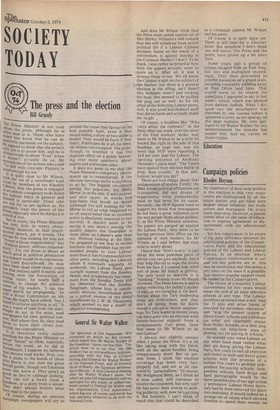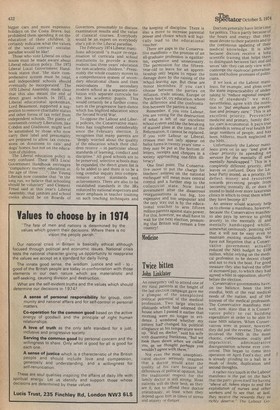Education
Campaign policies
Rhodes Boyson
My experience of door-step politics in this election is that very many voters are disillusioned by all the major parties and are filled with despair about inflation, the trade unions and mortgages. On every tenth door-step, however, a parent comes alive on the issue of education to express agreement or disagreement with my educational views.
Yet few voters seem to be aware of the deep difference between the educational policies of the Conservative Party and the educational policies of the Labour and Liberal Parties. In an election, where Conservative confrontation is out and low-key policies are in, this may be intentional, but this seems a pity since on the issue it is possible that massive popular support could be raised for the Conservatives.
The return of a majority Labour Government for five years would mean the end of all state selective schools of any type. The Labour manifesto promises that it will "end the 11 plus and other forms of selection for secondary education" and "stop the present system of Direct Grant Schools and withdraw tax relief and charitable status from Public Schools, as a first step towards our long-term aims of phasing out fee paying in schools."
So anyone who votes Labour on any other issue must realise what they are doing: giving the Labour Party five years to end all selection and choice in state and direct grant schools with the promise of a further five years to prohibit independent fee-paying schools. Inde pendent schools, hard drugs and hard pornography would be the three prohibitions of our age unless a 'permissive' Labour Home Secre tary had by then removed the latter two restraints. It would indeed be a strange set of values which allowed families to spend their money on bigger cars and more expensive holidays on the Costa Brava. but prohibited them spending it on the education of their children. It certainly indicates what the values of the 'social contract' socialist paradise would be like! Those who vote Liberal on other issues must be made aware about Liberal education policy. The 1973 Liberal Local. Government Handbook states that "the state comprehensive system must be total, and independent schools should eventually be incorporated." The 1970 Liberal Assembly made clear that this also meant the end of direct grant schools. In 1973, a Liberal educational spokesman, Lord Beaumont, supported a suggestion to remove charitable status and other forms of tax relief from independent schools. The giants of nineteenth century Liberalism, like Cobden and Gladstone, might well be astonished by those who now carry their label and presumably are prepared to allow tax concessions on donations to cats' and dogs' homes. but not on the education of children.
The Liberal education policy is very confused. Their 1973 Local Government Handbook envisages "compulsory nursery education, at the age of three . . ."; the Young Liberals now consider that "in the long run, we believe that schooling should be voluntary" and Clement Freud said at this year's Liberal Assembly, that janitors and school cooks should be on Boards of Governors, presumably to discuss examination results and the value of classical courses. Everybody would be an expert on everybody else's job in the Liberal paradise.
The February 1974 Liberal manifesto advocated "a major re-organisation of curricula and school institutions to provide a more realistic last three years' education for non-academic children." Presumably the whole country moves to a comprehensive system of secondary educational chaos and then reintroduces the secondary modern school as a separate institution with separate curricula for the less academic pupils. This would certainly be a further comic turn in the progressive barn-dance which has blighted education since the Second World War.
To oppose the Labour and Liberal policies, the Conservative manifesto has toughened considerably since the February election. It recognises that many parents are "deeply worried about the quality of the education which their children receive — in particular about standards of learning, conduct and discipline." All good schools are to be preserved, selective schools may be expanded. the direct grant list is to be added to and there is to be a long overdue inquiry into comprehensive school standards and achievements. There are also to be established standards in the 3Rs enforced by national inspectors and more emphasis in teacher training on such teaching techniques and the keeping of discipline. There is also a move to increase parental power and choice which will logically lead to the educational voucher.
There are gaps in the Conservative manifesto — the promise of an all-graduate profession is egalitarian, expensive and unnecessary. The permission for the fifteenyear-old to leave for an apprenticeship only begins to repair the damage done by the raising of the school leaving age. But these are minor blemishes. If you can't choose between the parties on inflation, trade unions, Europe or North Sea Oil, try education, where the difference and the confrontation between the parties is real.
Remember, if you vote Labour, you are voting for the destruction of what is left of our excellent school system and like the breaking of stained glass at the time of the Reformation, it cannot be replaced. If . you vote Labour or Liberal, crosses may not only appear on ballot forms in twenty years' time — they may be put at the bottom of letters, receipts and cheques in a society approaching one-fifth illiteracy! One final point. The Conservative move to put the charge for teachers' salaries on the national exchequer will mean more central control and a further step to the collectivist state. Now local government after the disastrous reorganisations is too big, too expensive and too unpopular and the only way out is by the educational voucher to arm fifteen million parents against state power. For this, however, we shall have to wait for the next election, presuming that Britain will remain a free country!

































 Previous page
Previous page